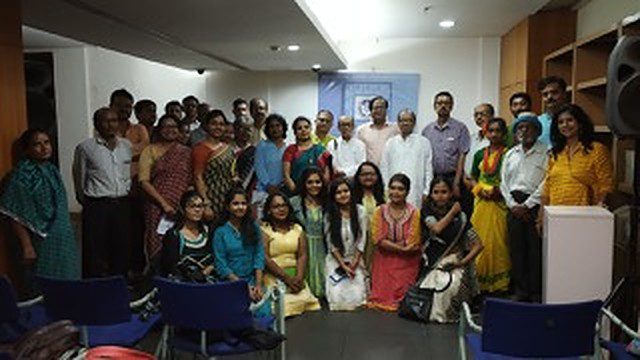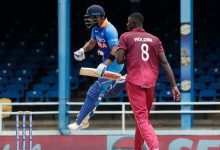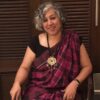Saptaparna reports the Bangla Dalit Interface, a seminar on Dalit literature and the exclusion of the subalterns, for Different Truths.
Intercultural Poetry and Performance Library (IPPL) housed at ICCR, Kolkata, initiated a pathbreaking enterprise of foregrounding Bangla Dalit Literature on the evening of 10th August, 2019. With the lighting of the lamp of knowledge as a witness to the inaugural session, Gautam De, Regional Director, ICCR, underlined the politics behind the criticism levelled against the aesthetics of Dalit writing. The event was also an occasion to commemorate the Gujarati Dalit poet, Neerav Patel, who passed away on 15th May, 2019, as well as Toni Morrison, the recently deceased African-American Nobel Laureate.
The attraction of the evening was a dramatic presentation of an extract from Bangla Dalit writer Manohar Mouli Biswas’s ‘Hidimbaa-Ghatotkach Sanglaap’ by Fakir Chand College Drama Club
Coordinator for the event, Mandakini Bhattacherya, recited Neerav Patel’s poem ‘Ostracised Flowers’ (‘Bahishkrito Phoolo’) as an apposite beginning, followed by a performance of Shyamal Kumar Pramanik and Annabhau Sathe’s poems by the students of New Alipore College. The attraction of the evening was adramatic presentation of an extract from Bangla Dalit writer Manohar Mouli Biswas’s ‘Hidimbaa-Ghatotkach Sanglaap’ by Fakir Chand College Drama Club, Diamond Harbour, as a tribute to the writer,present in the audience.
The evening unfurled with a one-of-a-kind interactive panel discussion moderated by Prof. Jaydeep Sarangi, Principal, New Alipore College, who has a substantial contribution to the translation and critical appreciation of Dalit writing. The first panel included Dhurjati Lashkar, Kapilkrishna Thakur and Nakul Mallik; and the second panel moderated by Dr. Arindam Mridha, Rabindra Bharati University, comprised of Srimati Kalyani Thakur, Manohar Mouli Biswas and Jatin Bala.
Lashkar, who has contributed to the establishment of Dalit Rights and has dedicatedly written about the Sundarbans area, delineated the etymological provenance and mutation of the term ‘Pod’ or ‘Poundra’, a Dalit community prominent in South Bengal.
Lashkar, who has contributed to the establishment of Dalit Rights and has dedicatedly written about the Sundarbans area, delineated the etymological provenance and mutation of the term ‘Pod’ or ‘Poundra’, a Dalit community prominent in South Bengal. It was Meenakshi Mukjherjee’s seminal introduction and translation of Manoranjan Byapari’s ‘Is there Dalit Writing in Bangla?’, published in 2007, that opened an uncharted avenue of research.
Nakul Mallik spoke of his own dejection as a Dalit writer along with the omnipresence of a stringent stratification of the caste system across India with no ladder connecting each stratum. The identity crisis ‘Who are we?’ was, for him, the starting point of his quest inspired by Baba Saheb Ambedkar. For an access to power andolan is a pre-requisite leading to the growth of consciousness through a sustained literary movement. From Tagore to Gorky to Shibram Chakraborty, the speakers alluded to stalwarts to establish their argument about discrimination and inequality in India.
Kapilkrishna Thakur, of Ujantalir Upakatha fame, referred to the gory incidents of lovejihad and immolation in Muzaffarpur and Midnapore alike.
Kapilkrishna Thakur, of Ujantalir Upakatha fame, referred to the gory incidents of love jihad and immolation in Muzaffarpur and Midnapore alike. Srimati Kalyani Thakur mesmerised the audience with the powerful rendition of her poems to deride the continuum of demolition of statues of Dalit iconoclasts and Dalit suicides in universities as a pan-Indian phenomenon. M. M. Biswas, President, Bangla Dalit Sahitya Sanstha, underscored the need for an andolan of atmasamman citing the case of Chuni Kotal, the first Dalit Shabar woman graduate, who committed suicide post intensive harassment on 16th August, 1992.
He opened a debate on the Ram Sanskritisation and Hindu fundamentalisation of Indian culture. Moderator Dr. Mridha spoke about his struggle to include Dalit Literature in the syllabus.
Bala recited a poem entitled ‘Anuprobeshkari’ to drive home his forecasts about the issues of NRC, immigration and citizen’s rights that will engulf the whole of India.
Bala recited a poem entitled ‘Anuprobeshkari’ to drive home his forecasts about the issues of NRC, immigration and citizen’s rights that will engulf the whole of India. This enriching occasion with a houseful of listeners was formally closed with a vote of thanks from the coordinator, Dr. Aparna Singh.
Photos by the organisers





 By
By
 By
By
 By
By
 By
By